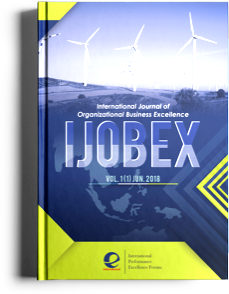Abstract
This paperpresentsthe central results of a survey analysis carried out in the UAE with respect to business excellence initiatives. The main purpose of this research is to investigate the use of business excellenceinitiativesin Dubai quality award-wining organizations. Thestudyused a self-administered questionnairetoconfirm the adaptability of business excellence initiativesby Dubai quality award-wining organizations. Several statistical tests including descriptive statistics, internal consistency reliability and content validitywere employed using the Statistical Package for the Social Sciences(SPSS). The result of the study shows that various business excellence initiatives already implemented byDubai quality award-wining organizations for their efforts towards business excellence. The award-wining organizations believe that business excellenceinitiatives areimportant in helping them reach their organizational goals.
References
Adebanjo, D. (2001). TQM and business management: Is there really a conflict? Measuring Business Excellence, 5(3), 37 – 40.
Brown, A. R. (2014). Organizational paradigms and sustainability in excellence. International Journal of Quality and Service Sciences, 6(2-3), 181 – 190.
Dahlgaard, J. J., Chen, C-K., Jang, J-Y., Banegas, L. A. and Dahlgaard-Park, S. M. (2013). Business excellence models: Limitation, reflections and further development. Total Quality Management & Business Excellence, 24(5-6), 519 – 538.
Dahlgaard-Park, S. M. (2011). The quality movement: Where are you going? Total Quality Management & Business Excellence, 22, 493 – 516.
Dahlgaard-Park, S. M. and Dahlgaard, J. J. (2010). Organizational learnability and innovability: A system for assessing, diagnosing and improving innovations. International Journal of Quality and Service Sciences, 2(2), 152 – 174.
Doulatabadi, M. and Yusof S. M. (2015). Ranking measures for sustaining quality excellence practices: An empirical investigation. Industrial Engineering, Management Science and Applications Lecture Notes in Electrical Engineering, 349, 1009 – 1024, Springer, Berlin.
EFQM Annual Report 2014. (April 29th, 2015). Retrieved from https://issuu.com/vingolf/docs/efqm_annual_report_2014
Hughes, A. and Halsall, D. (2002). Comparison of the 14 deadly diseases and the business excellence model. Total Quality Management, 13(2), 255 – 263.
Lam, E., Chan, A. and Chan, D. (2004). Benchmarking design-build procurement system in construction. Benchmarking: An International Journal, 11(3), 287 – 302.
Mann, R., Adebanjo, D., Laosirihongthong, T. and Punnakitikashem, P. (2011). Awareness and impact of business excellence in Asia. Total Quality Management and Business Excellence, 22(11), 1237 – 1258.
Miguel, P. (2001). Comparing the Brazilian National Quality Award with Some of the Major Prizes. TQM Magazine, 13(4), 260–272. http://dx.doi.org/10.1108/09544780110391675
Porter, L. J. and Tanner, S. J. (2012). Assessing business excellence: A guide to business excellence and self-assessment (2nd ed.) Elsevier Ltd.
Puay, S. H., Tan, K. C., Xie, M. and Goh, T. N. (1998). A comparative study of nine national quality awards. Total Quality Management Journal, 10(1), 30 – 39. Saunders, M. N. (2007). Research methods for business students (5th ed.). Pearson Education: India. Sila, I. and Ebrahimpour, M. (2002). An investigation of the Total Quality Management survey-based research published between 1989 – 2000: A literature review. International Journal of Quality & Reliability Management, 19(7), 902 – 970.
Wang, C. L. and Ahmed, P. K. (2003). Organisational learning: A critical review. The Learning Organization, 10(1), 8 – 17.
Zairi, M. and Alsughayir, A. A. (2011). The adoption of excellence models through cultural and social adaptations: An empirical study of critical success factors and a proposed model. Total Quality Management & Business Excellence, 22(6), 641-654.

This work is licensed under a Creative Commons Attribution-NonCommercial-ShareAlike 4.0 International License.
Copyright (c) 2020 BINUS Higher Education

